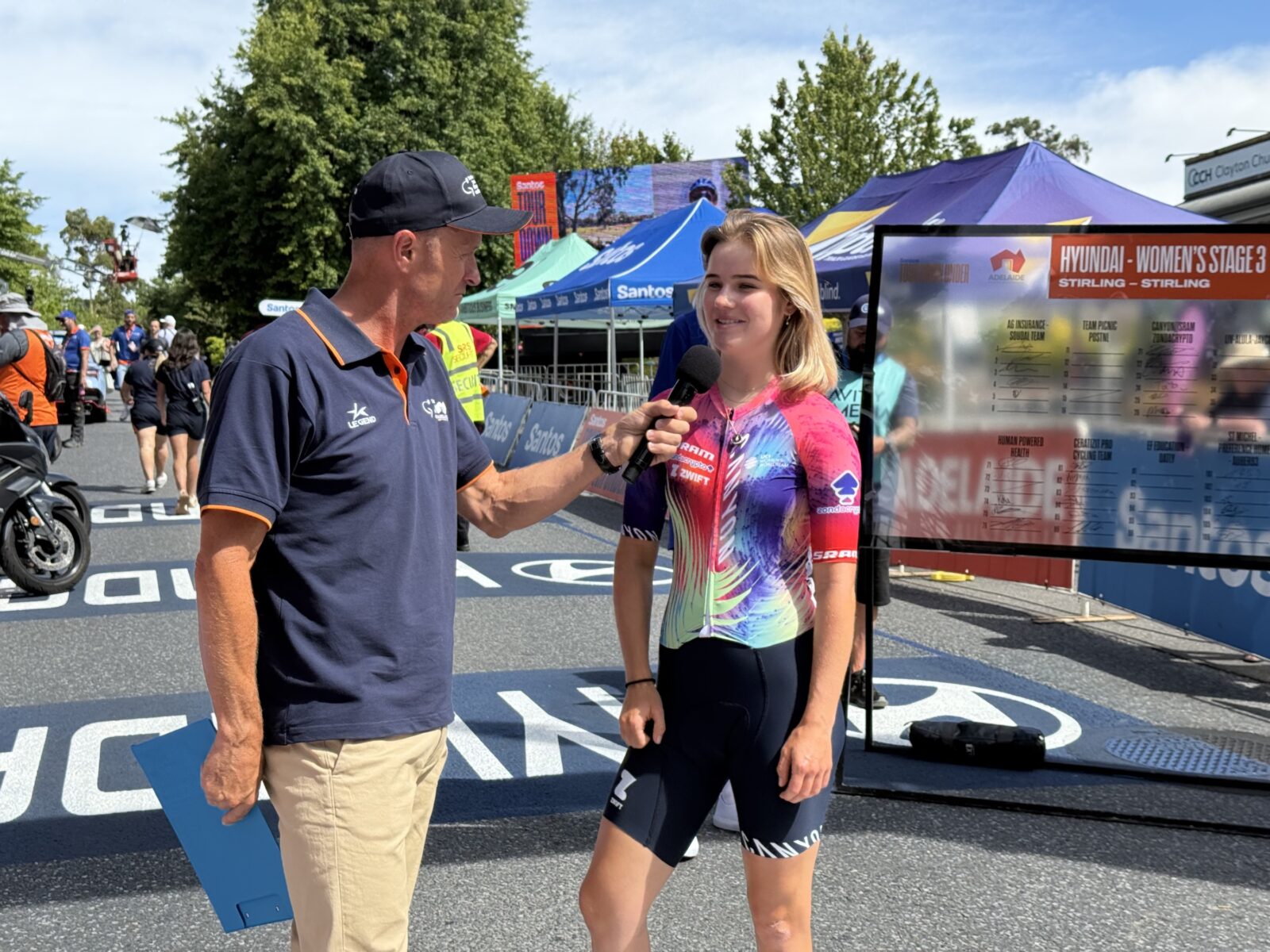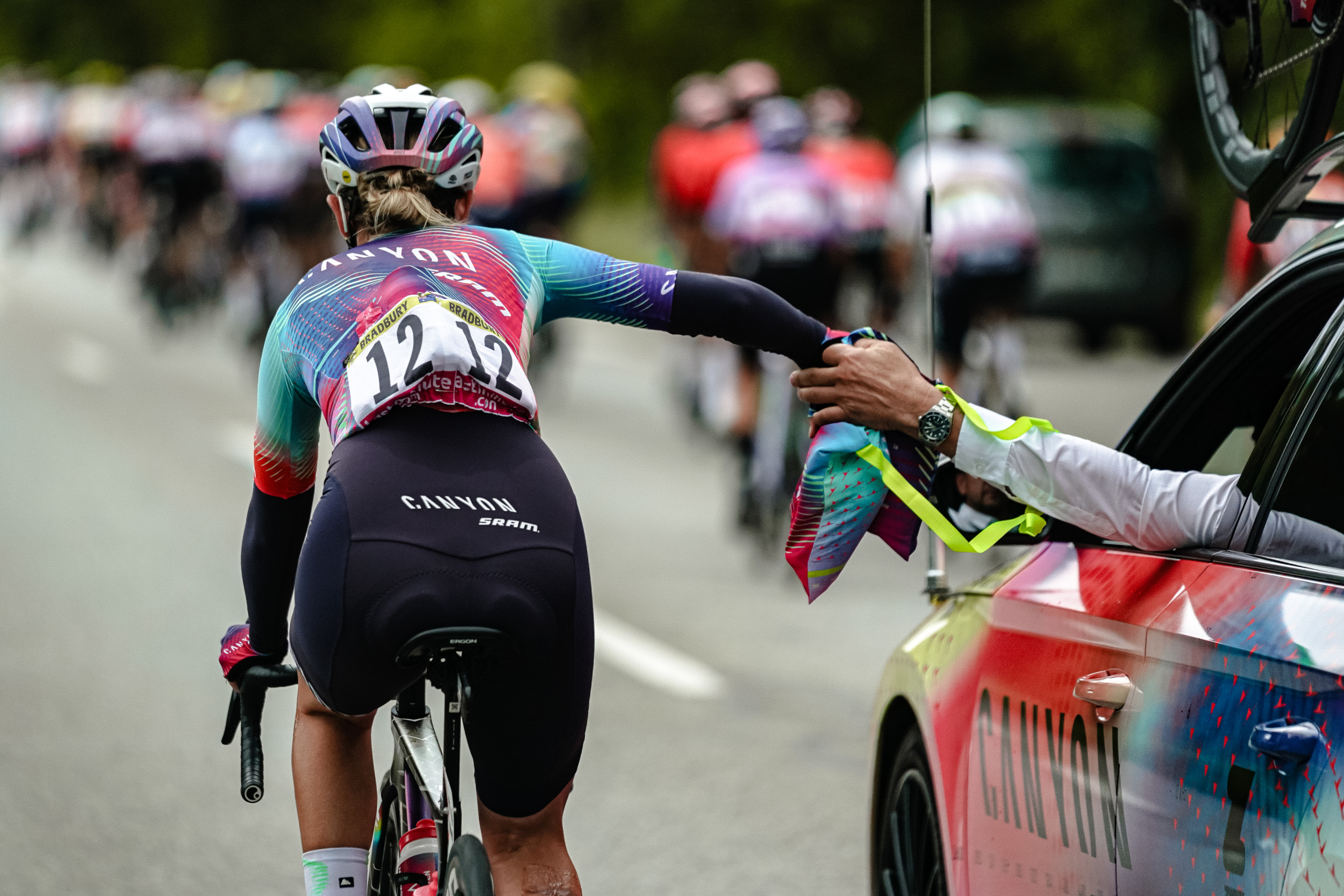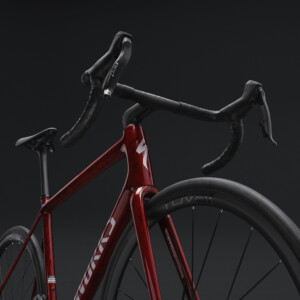The young Australian who went from teenage Zwift Academy winner to ‘world-class’ climber in just four seasons shares some of the secrets of her success with editor Nicola Rutzou.
The diminutive 23-year-old Melburnian has emerged as one of the best climbers in the peloton and has set herself some lofty goals, like winning the biggest race in the women’s peloton – the Tour de France Femmes. Bradbury was recruited by the leading women’s team Canyon-SRAM zondacrypto after winning the Zwift Academy competition in 2020.
While she’s a future leader, her main role right now is as a key support rider in races like the Tour de France Femmes for champion Kasia Niewiadoma-Phinney.
Last year was a breakthrough year for Bradbury with a stage win and second place overall at the Tour de Suisse, and a stage win and third place overall at the Giro d’Italia Women, where she also secured the Best Young Rider jersey. She also earned a silver medal in the Under-23 Women’s road race at the UCI Road World Championships.
Her current contract with the high-profile team runs to 2027.

How did you get into cycling?
When I was around 12, my twin sister, brother, and dad were riding, and I was just watching. I was doing ballet at the time. They were riding for two years before I decided to give it a go. I found I really liked riding my bike, and I also really liked how social it was.
What kept you interested over the years, then?
I still like how social it is, but I really just like riding my bike. When I decided I wanted to go pro, I started training more, and found I still love riding my bike. And I also love winning, feeling fast, and the tactics involved.
Was it challenging adjusting to life away from home and on the other side of the world at just 18 years old?
It was quite hard, especially because it was in 2021, and I turned professional in Australia, when there were strict lockdowns. My family couldn’t come (to Europe), and I had a flight back (to Australia) in September, and three days out, it got cancelled. I remember being so excited to go home, and suddenly, I couldn’t go home until the end of December. The ‘not knowing’ when or if I could go home was pretty scary.
How did you adjust to life away from home, like cooking and fending for yourself?
Yeah, fine. I like living by myself and having to learn how to be a proper adult without having parents nagging me. I also like the double summer, which is great. That’s a definite benefit.
Where did you live when you first moved to Europe?
I was in Girona and still live there part of the time. I also have a place in Andorra, which is about three hours away, but if the weather is not nice in Andorra because it’s a mountainous region, then I go back down to Girona, so I still spend a fair bit of time there.
If you hadn’t won the Zwift Academy competition, do you think your career would have taken off as quickly?
Ah, no doubt it would have taken longer, because, like I said in 2021, Australia was still in quite a strict lockdown. You couldn’t travel unless it was for work. And even still, they almost didn’t let me leave, even though I was leaving for work, so I couldn’t have travelled overseas to race, which is pretty important when you’re trying to get a pro contract. I would have had to wait another year, and you never know what would have happened.

Last year, many commentators described you as having a real breakthrough year with your great results. How do you deal with the pressure of that coming?
I still feel pressured, but I also felt pressure last year. I didn’t necessarily feel like I had more pressure now. I just have to use it as a strength rather than a weakness. There’s pressure for a good reason.
You were the team leader for Vuelta España Femenina. How hard was it to rise above your disappointing Stage 2 crash and time loss?
Yeah, it was pretty hard. I was also not in very good physical shape for several reasons. I had to accept it and use it as a learning experience. I learned about myself.
Were you happy with your results at the Tour de Suisse?
Yeah, not if you look at my results, but if you look at the team results, yes. It was a really good race, and I played a role in Kasia’s (Kasia Niewiadoma-Phinney) third place in the GC, so yes, I’m happy with my result.
What does a successful Tour de France look like for you?
For me, it’s harder to make it tangible because I’ll be supporting Kasia. There’s also a lot that you can’t see in the race. For example, yesterday (at the Tour de Suisse), she got a puncture, and so I waited and stopped on the side of the road for her, brought her back up, and left. You can’t put that into numbers and statistics.
If a stage win opportunity comes, then for sure, we’ll go for it, but we’ll go all in for Kasia.
How do you overcome the power of the big riders like Demi Vollering?
We just have to try to outsmart them and go into races with the mindset that they’re stronger, but not necessarily smarter. And there’s always some way that you can win, but it is hard against those ladies.
What comes after the Tour de France for you? Are you targeting the World Champs?
Yeah, I will be. I’ll be doing Romandie, which is about two weeks after the finish of the Tour de France, and then I’ll hopefully go to Worlds. The small repetitive hills in Rwanda suit me. It’s an elimination race, which suits me well. It’ll be like the survival of the fittest, and I like a hard, gruelling race. (unfortunately Neve withdrew from the Australian team and didn’t attend the World Championships)
Where’s your favourite place to ride?
Mainly because it’s fresh in my mind, but Switzerland was so nice. The scenery, the roads, the road surface, and you go so quick. All the roads are so smooth, and the scenery is insane. Sometimes you just have to stop for a minute and look around.
What are your long-term goals?
Cycling is one of those sports where you can be professional for quite a long time, so I would say maybe eight to ten years. I don’t know. It’s hard to tell, but I want to win a Grand Tour, the Tour de France.
Who are your mentors who have helped you develop your career?
I often ask my parents for advice. I also look up to my teammate Tiffany Cromwell. She’s a really cool chick. I met her when I was about 13 because Dad knew someone who knew her. We rode with her, and I got a photo with her. Then, every year, she would wish me a happy birthday. Then I turned pro, and we became teammates, which is really sick.
You didn’t race at the Nationals this year. Are you planning to be there next year?
It depends on when I come home. Maybe I can do it on the way home because it’s already four hours closer to Europe. However, I won’t be able to make a decision for quite a long time.
Who sets your program for the year?
My coach has input, but it’s mainly my team. My coach will have a conversation with the DSs (Director Sportifs of the team), and they’ll work together to decide the best plan for me. Then, they’ll show me. I have a little bit of say.
This year, I won’t be going to the women’s Giro because I will be training at altitude for three weeks before the Tour de France. This year, there will be a lot less racing and a lot more training.
Nicola Rutzou – a long-time contributor and, most recently, the editor of Bicycling Australia. Nicola is a keen Sydney-based road cyclist who writes reviews, news, and destination pieces.


